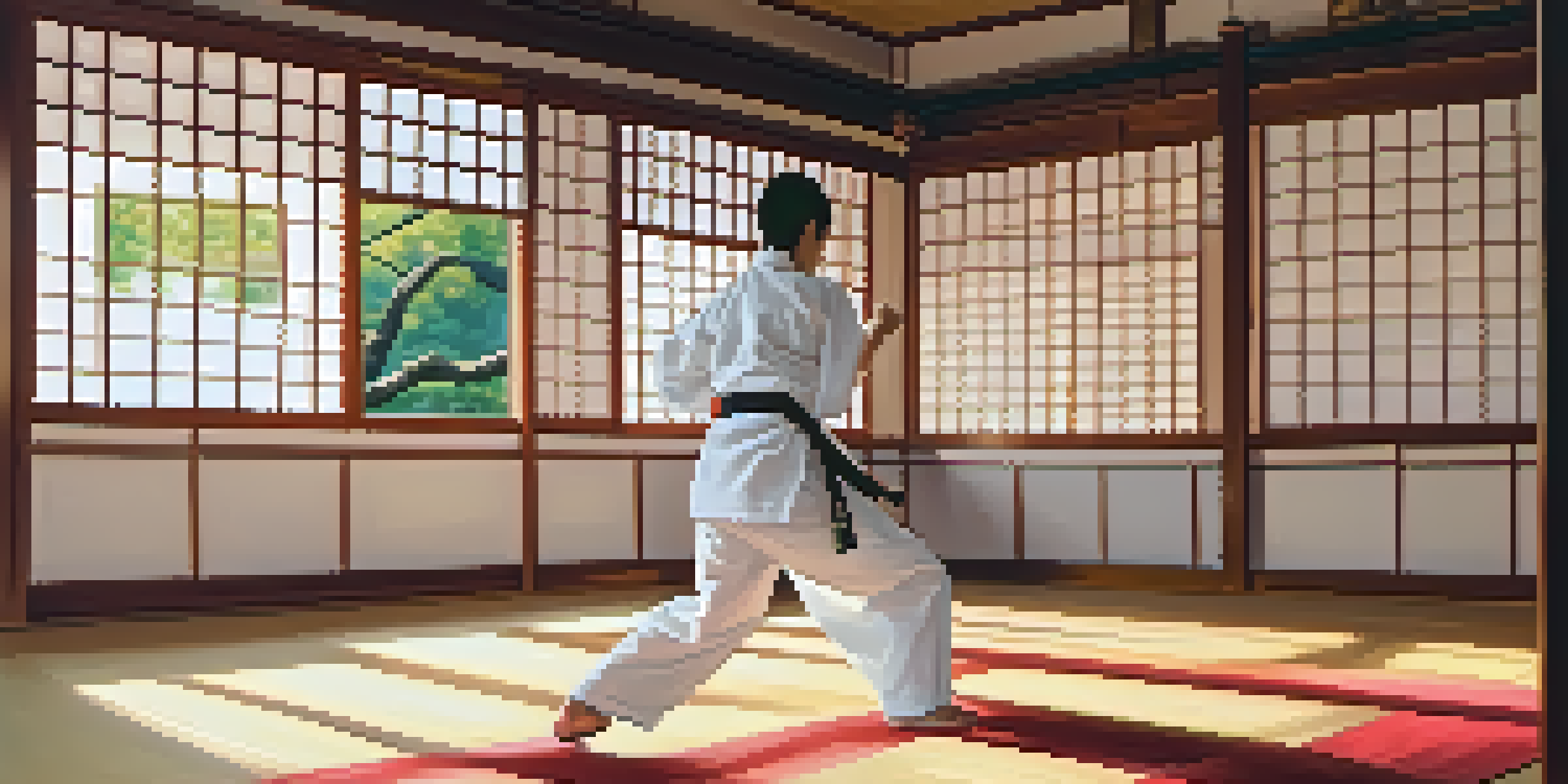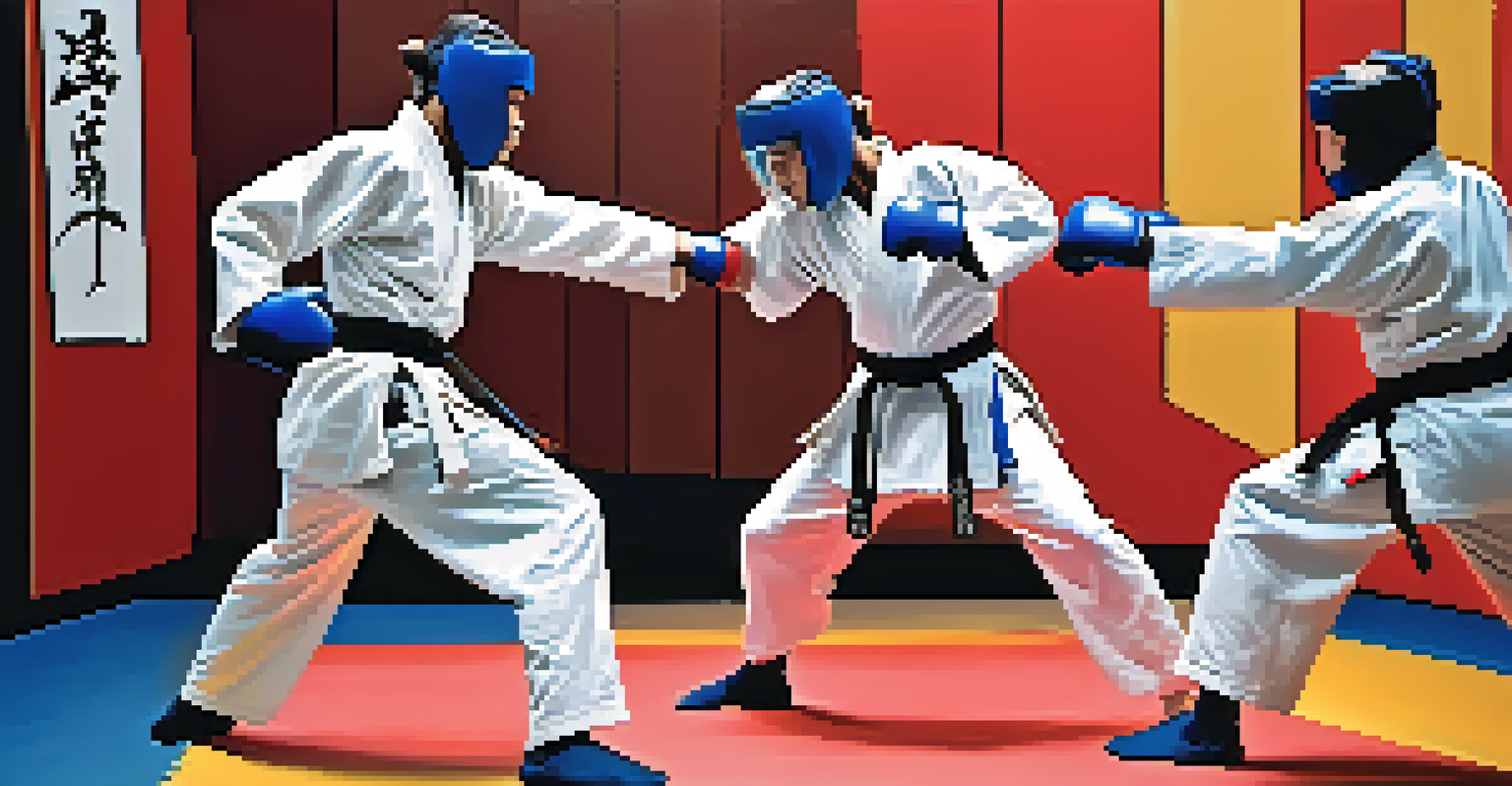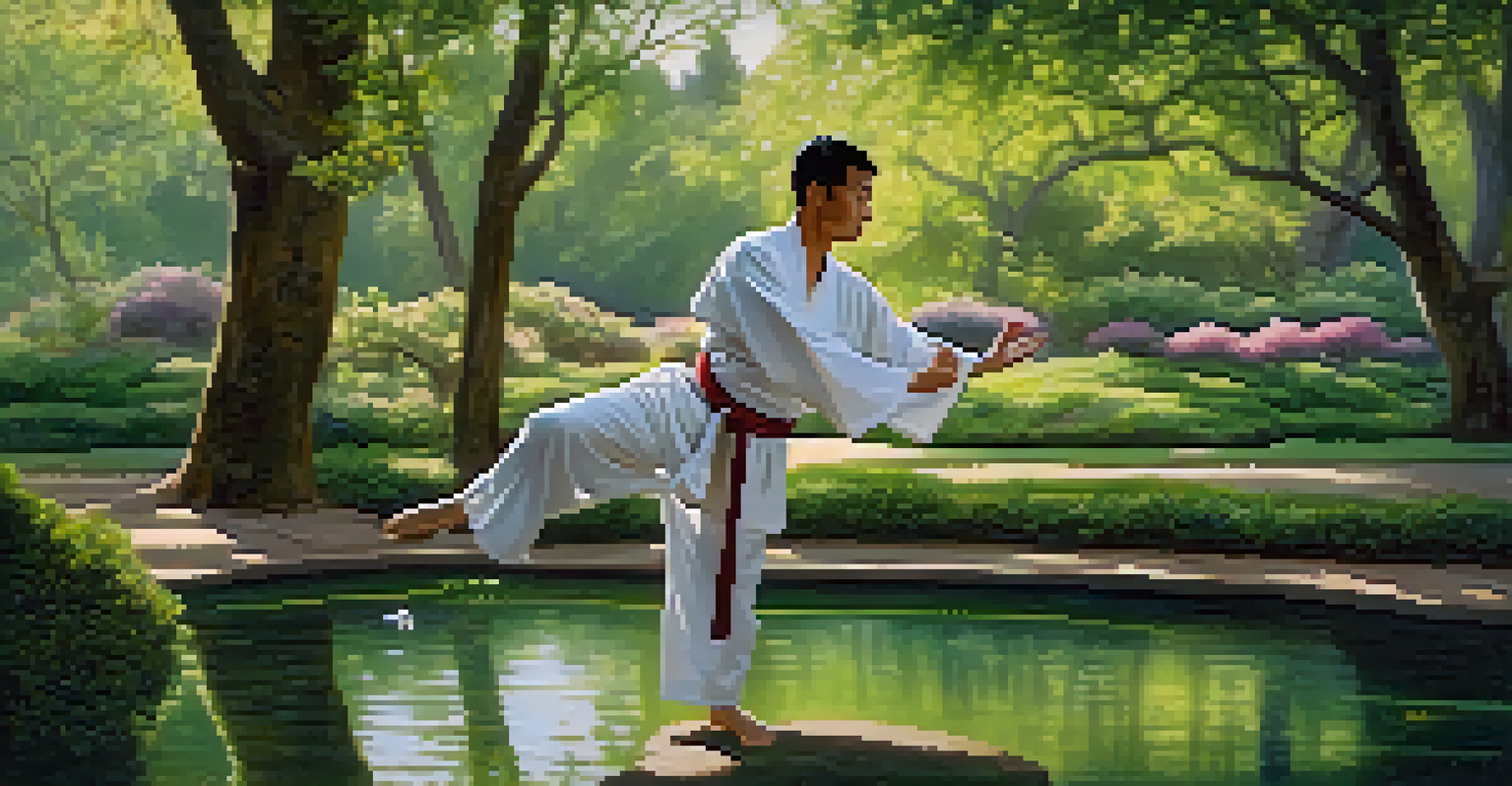The Role of Discipline in Martial Arts and Conflict Resolution

Understanding Discipline in Martial Arts
Discipline in martial arts is more than just following rules; it’s about cultivating a mindset focused on self-control and respect. Practitioners learn to master their bodies and minds, which is essential for both training and daily life. This foundational aspect not only enhances their skills but also shapes their character, teaching them patience and perseverance.
The ultimate aim of martial arts is not having to use them.
For example, consider a student practicing karate. Each punch and kick requires not just physical strength but a disciplined approach to technique and timing. This commitment to discipline transforms their practice into a journey of personal growth, where they learn to set goals and achieve them through consistent effort.
Ultimately, this discipline transcends the dojo, influencing how individuals handle challenges outside of martial arts. It fosters a sense of responsibility and encourages a proactive approach to conflict, equipping them with the tools to navigate difficult situations.
The Connection Between Discipline and Self-Defense
In martial arts, discipline plays a pivotal role in self-defense training, where control is paramount. Students learn that the ability to defend oneself is not just about physical prowess but also about understanding when to act and when to remain calm. This mindset allows practitioners to assess situations critically, reducing the likelihood of unnecessary confrontations.

For instance, during training, a martial artist might practice techniques that emphasize de-escalation, reinforcing the idea that avoiding violence is often the best option. This approach helps build confidence, enabling them to stand their ground without resorting to aggression. As a result, they become not just fighters but also peacekeepers.
Discipline Enhances Personal Growth
Martial arts discipline cultivates self-control and respect, promoting personal development both on and off the mat.
This disciplined mindset helps practitioners to maintain composure in high-pressure situations. When faced with a potential conflict, they can draw upon their training to respond thoughtfully rather than react impulsively, which is crucial for effective self-defense.
Discipline as a Tool for Emotional Regulation
Martial arts training emphasizes emotional regulation through disciplined practices, allowing individuals to manage their feelings better. This is particularly important in conflict situations, where strong emotions can cloud judgment and lead to rash decisions. By learning to control their emotions, martial artists can approach conflicts with a clear mind.
Discipline is the bridge between goals and accomplishment.
For example, during sparring sessions, fighters often experience frustration or anger when struck or outmaneuvered. However, disciplined training teaches them to channel these emotions positively, using them to fuel their performance rather than detract from it. This emotional intelligence becomes a vital asset in resolving conflicts both on and off the mat.
Ultimately, the discipline learned in martial arts fosters resilience, helping practitioners to remain calm in the face of adversity. This ability to manage emotions not only benefits their martial arts practice but also enhances their overall interpersonal relationships.
Building Respect Through Martial Arts Discipline
Respect is a cornerstone of martial arts, cultivated through disciplined training and interactions. Practitioners learn to respect their instructors, peers, and even opponents, which creates a culture of mutual understanding. This respect is essential when navigating conflicts, as it encourages open communication and collaboration.
For instance, during a training session, students are taught to bow to one another as a sign of respect, reinforcing the idea that everyone has something valuable to contribute. This practice fosters a sense of community and support, making it easier to engage in constructive discussions during conflicts.
Discipline Aids in Conflict Resolution
The disciplined mindset learned in martial arts equips practitioners to handle conflicts thoughtfully and effectively.
As martial artists carry this respect into their daily lives, they become more adept at resolving disputes amicably. This respectful approach allows for more productive conversations, paving the way for peaceful resolutions.
Discipline in Setting and Achieving Goals
Goal-setting is an integral part of martial arts training, driven by the discipline that practitioners develop over time. Setting clear, achievable goals helps individuals stay focused and motivated on their journey. This structured approach to personal development is invaluable, especially when facing conflicts that require resolution.
For example, a martial artist might set a goal to earn a new belt rank, which demands dedication and consistent effort. The process of working toward this goal reinforces the importance of discipline, as they must train regularly and overcome obstacles. This commitment translates to other areas of life, including conflict resolution.
By applying the same disciplined mindset to conflict situations, individuals can set objectives for resolving disputes, such as finding common ground or understanding differing perspectives. This goal-oriented approach ensures that conflicts are addressed thoughtfully and effectively.
The Role of Discipline in Conflict Prevention
Discipline in martial arts is not just about managing conflicts; it’s also about preventing them from arising in the first place. Through rigorous training, practitioners learn to recognize potential threats and respond appropriately, often avoiding confrontations altogether. This proactive approach is crucial for fostering a peaceful environment.
For instance, during training, martial artists practice situational awareness, which equips them to identify escalating tensions before they become problematic. This heightened awareness allows them to navigate social interactions more smoothly, reducing the likelihood of misunderstandings or conflicts.
Respect Builds Stronger Connections
Through disciplined training, martial artists develop respect for others, fostering better communication and collaboration in conflict situations.
Moreover, the discipline instilled through training encourages individuals to communicate openly and assertively. By addressing issues before they escalate, martial artists can maintain harmony in their relationships, illustrating the preventive power of discipline.
Applying Martial Arts Discipline to Everyday Life
The principles of discipline learned in martial arts have far-reaching implications beyond the dojo. Practitioners often find that the skills they acquire translate seamlessly into their everyday lives, enhancing their ability to handle conflicts with grace and poise. This adaptability highlights the universal value of martial arts training.
For example, an individual might use their disciplined approach to time management, ensuring they allocate time for training, work, and family. This balance allows them to prioritize effectively, reducing stress and potential conflicts arising from neglecting responsibilities.

Additionally, the conflict resolution skills honed through martial arts training encourage practitioners to approach life’s challenges with confidence. Whether it’s dealing with a difficult coworker or navigating a family disagreement, the discipline they’ve cultivated empowers them to address conflicts constructively.